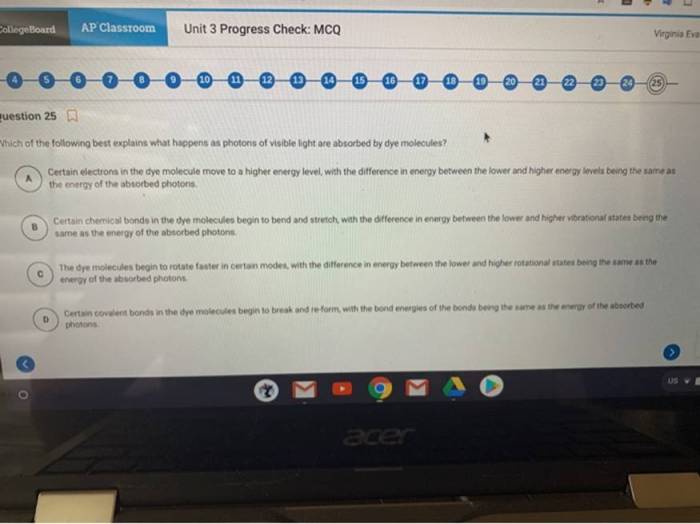Embarking on the journey of AP Biology Unit 3 Progress Check MCQs, this comprehensive guide unveils the intricacies of this assessment, empowering students with the knowledge and strategies to excel.
Delving into the depths of Unit 3, we explore the major concepts, analyze the types and difficulty levels of MCQs, and uncover the key strategies for effective answering.
Unit 3 Overview

Unit 3 of AP Biology delves into the intricacies of cellular processes, energy transformations, and the regulation of these essential functions within living organisms.
The progress check MCQs assess your understanding of fundamental concepts such as cell structure and function, cellular respiration, photosynthesis, cell division, and genetics.
Cell Structure and Function
This examines the components and organization of cells, including organelles, membranes, and their roles in cellular processes.
- Describe the structure and function of cell membranes, cytoplasm, and organelles.
- Explain the concept of cell theory and its historical development.
Cellular Respiration
This section explores the process of cellular respiration, the energy-generating pathway that occurs in cells.
- Describe the stages of cellular respiration: glycolysis, Krebs cycle, and electron transport chain.
- Explain the role of ATP as the energy currency of cells.
Photosynthesis
This focuses on the process of photosynthesis, the energy-capturing pathway that occurs in plants and other photosynthetic organisms.
- Describe the light-dependent and light-independent reactions of photosynthesis.
- Explain the role of chlorophyll and other pigments in photosynthesis.
Cell Division
This section examines the processes of cell division, including mitosis and meiosis.
- Describe the stages of mitosis and meiosis, including chromosome behavior.
- Explain the role of cell division in growth, development, and reproduction.
Genetics
This introduces the fundamental principles of genetics, including inheritance patterns and genetic variation.
- Describe Mendelian inheritance patterns, including dominant and recessive alleles.
- Explain the concepts of genotype and phenotype.
MCQs Analysis

Multiple-choice questions (MCQs) in the Unit 3 progress check assess students’ understanding of fundamental concepts, theories, and experimental techniques in cellular energetics.
MCQs in this unit vary in difficulty, ranging from straightforward to challenging. They typically present students with a scenario, question, or statement followed by several possible answers.
Types of MCQs, Ap biology unit 3 progress check mcq
- Factual Recall:Test basic knowledge of concepts and definitions.
- Application:Require students to apply concepts to novel situations.
- Analysis:Assess students’ ability to break down complex ideas and identify relationships.
- Evaluation:Challenge students to make judgments and form opinions.
Tips for Answering MCQs Effectively
- Read the question carefully:Identify the main concept being tested.
- Consider all answer choices:Eliminate obviously incorrect options before making a selection.
- Use process of elimination:Rule out choices that contradict your understanding of the concept.
- Guess intelligently:If unsure, make an educated guess based on your knowledge of the topic.
- Check your work:If time permits, review your answers and ensure they align with the question.
Key Concepts

The Unit 3 progress check MCQs assess students’ understanding of fundamental concepts in cell communication and cell cycle regulation. Grasping these concepts is crucial for success in AP Biology as they form the foundation for understanding higher-level topics in cellular and molecular biology.
Key concepts tested in the MCQs include:
- Signal transduction pathways and their components
- Cell cycle checkpoints and their regulation
- Mechanisms of cell division (mitosis and meiosis)
- The role of cell cycle regulators in controlling cell division
Signal Transduction Pathways
Signal transduction pathways are crucial for cells to receive and respond to external stimuli. The MCQs test students’ understanding of the components of these pathways, including receptors, ligands, and second messengers, as well as the mechanisms by which signals are transmitted within the cell.
Cell Cycle Checkpoints
Cell cycle checkpoints are critical control points that ensure the fidelity of DNA replication and cell division. The MCQs assess students’ knowledge of the different checkpoints, the mechanisms that regulate them, and the consequences of checkpoint failure.
Mechanisms of Cell Division
Cell division is essential for growth, development, and reproduction. The MCQs test students’ understanding of the mechanisms of mitosis and meiosis, including the stages of each process and the key regulatory proteins involved.
Cell Cycle Regulators
Cell cycle regulators are proteins that control the progression of the cell cycle. The MCQs assess students’ knowledge of the different types of cell cycle regulators, their mechanisms of action, and their roles in ensuring the proper timing and coordination of cell division.
Study Strategies: Ap Biology Unit 3 Progress Check Mcq

Preparing for the Unit 3 progress check MCQs requires a well-structured study plan and effective study methods. By following these strategies, you can efficiently master the key concepts and enhance your performance.
To create a comprehensive study plan, begin by reviewing the course syllabus and identifying the topics covered in Unit 3. Allocate sufficient time for each topic, considering its complexity and your current understanding. Break down large topics into smaller, manageable chunks to avoid feeling overwhelmed.
Active Learning Techniques
- Spaced Repetition:Review the material at increasing intervals to strengthen memory retention.
- Active Recall:Regularly test your understanding by attempting practice questions or explaining concepts to yourself.
- Concept Mapping:Create visual representations of the relationships between key concepts to enhance comprehension.
Study Resources
- Textbooks and Course Materials:Thoroughly read and review the assigned textbooks and class notes.
- Online Resources:Utilize reputable websites and educational platforms that provide practice questions, videos, and simulations.
- Practice Exams:Take practice exams under timed conditions to simulate the actual testing environment.
Practice Questions

The following practice questions are designed to assess your understanding of the key concepts covered in Unit 3 of AP Biology. Carefully review each question and select the best answer from the options provided. Detailed answer explanations are included to facilitate self-assessment and reinforce your learning.
Instructions:Read each question carefully and select the best answer from the options provided. Refer to the answer explanations to check your understanding.
Cell Cycle Regulation
- Which of the following is a key regulator of the cell cycle?
- (A) Cyclin-dependent kinases (CDKs)
- (B) Cyclins
- (C) Both (A) and (B)
- (D) Neither (A) nor (B)
- What is the role of checkpoints in the cell cycle?
- (A) To prevent the cell from entering the next phase of the cell cycle until certain conditions are met
- (B) To repair DNA damage
- (C) To induce apoptosis
- (D) None of the above
- Which of the following is NOT a consequence of uncontrolled cell division?
- (A) Cancer
- (B) Birth defects
- (C) Aging
- (D) Heart disease
Answer:(C) Both (A) and (B)
Explanation:CDKs are enzymes that regulate the cell cycle by phosphorylating specific proteins. Cyclins are proteins that bind to CDKs and activate them.
Answer:(A) To prevent the cell from entering the next phase of the cell cycle until certain conditions are met
Explanation:Checkpoints are control points in the cell cycle that ensure that the cell is ready to proceed to the next phase. If certain conditions are not met, the cell cycle will be halted.
Answer:(D) Heart disease
Explanation:Uncontrolled cell division can lead to cancer, birth defects, and aging. Heart disease is not a direct consequence of uncontrolled cell division.
FAQ Compilation
What is the purpose of the Unit 3 Progress Check MCQs?
The MCQs assess students’ understanding of the major concepts covered in Unit 3 of AP Biology.
What types of MCQs are typically found in the Progress Check?
The MCQs cover a range of formats, including multiple-choice, true/false, and short answer questions.
How can I effectively prepare for the Progress Check MCQs?
Effective preparation involves reviewing the key concepts, practicing with sample MCQs, and utilizing study strategies such as flashcards and concept mapping.
